When is the Best Time to Start German Shepherd Training? Is it too late for you?

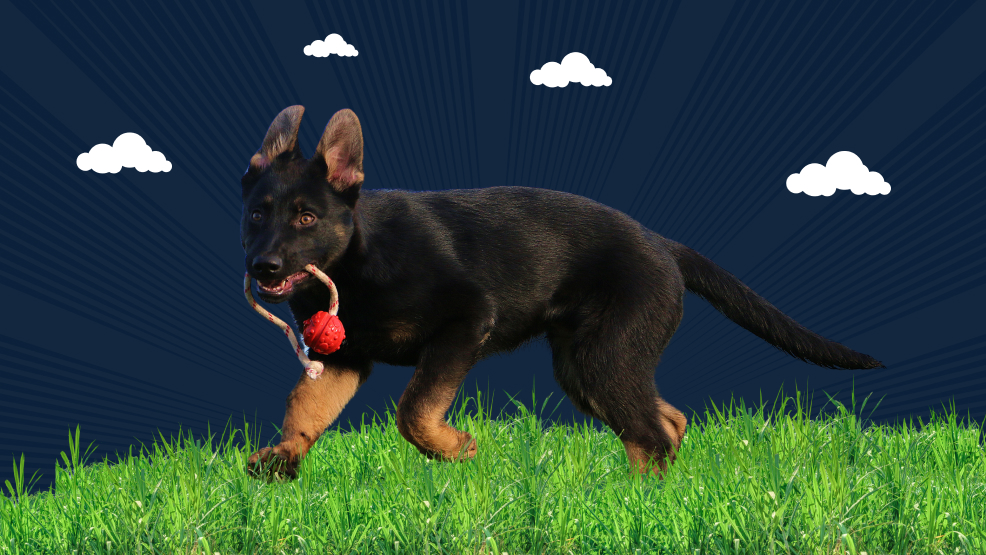
As a new German Shepherd puppy owner, you’re likely excited and eager to show them off to the world. Hence, you are probably wondering when the right time to start German Shepherd training is.
Training your German Shepherd puppy is a crucial aspect of their development, as it not only lays the foundation for good behavior but also strengthens the bond between you and your four-legged friend.
So keep reading because, in this guide, we will talk about the best age to start training a German Shepherd puppy, why it’s crucial to begin early, and how to make the process fun for both you and your pup.
When Should You Start Training a German Shepherd Puppy?
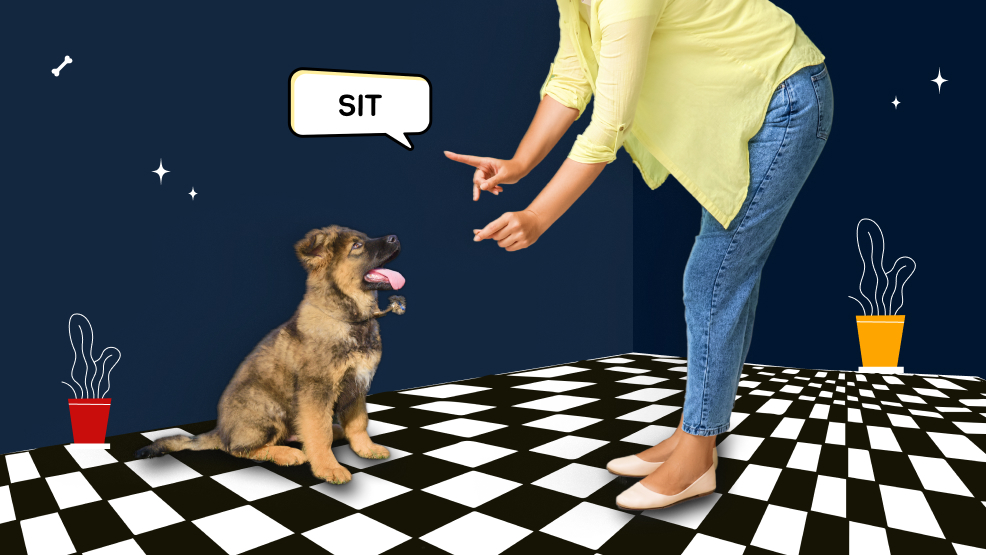
If you are wondering when to start training a German Shepherd puppy, the answer is as early as possible. In fact, you can start training them as soon as they have entered your house and have had some time to get used to you, other family members if any and their living space.
Starting training early is essential for several reasons. Firstly, puppies have an incredible ability to learn and absorb information during their formative months.
Their minds are like sponges, ready to share new experiences and knowledge. So, if you train them when they are still a puppy, you can instill positive behaviors and habits easily. It will help shape their personality and behavior for years to come.
Secondly, early training helps prevent the development of undesirable behaviors that can be difficult to correct later. Puppies are naturally curious and prone to exploring their surroundings, which can lead to destructive tendencies or inappropriate behavior if left unchecked.
By providing proper guidance and training from an early age, you can effectively redirect their energy and curiosity into positive outlets, fostering a well-behaved and confident companion.
Developmental Stages of a German Shepherd Puppy
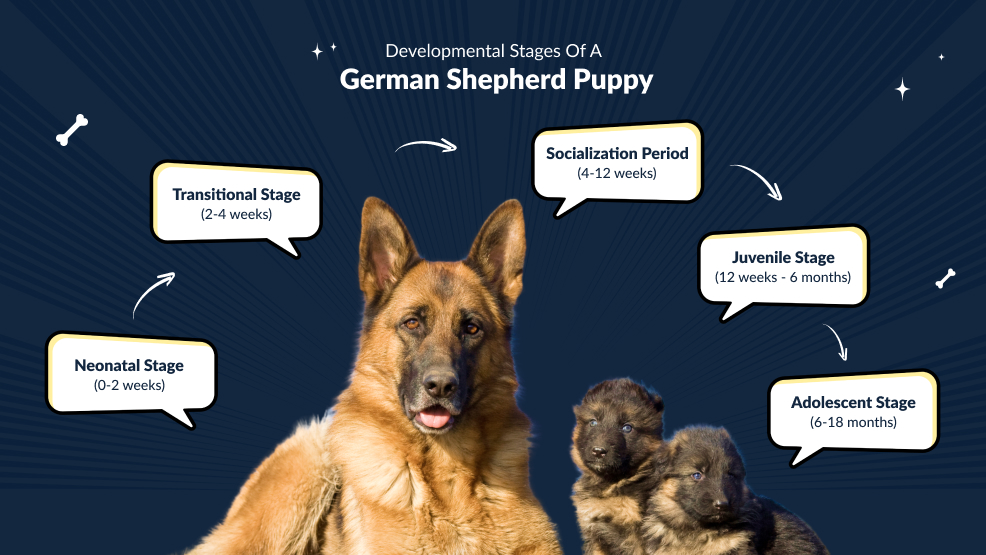
To understand the optimal time to start training your German Shepherd puppy, it’s essential to familiarize yourself with their developmental stages.
German Shepherds, like most breeds, go through distinct phases of growth and development, each with its unique characteristics and training opportunities.
- Neonatal Stage (0-2 weeks): During this stage, puppies depend entirely on their mother and have limited sensory abilities. Training is not recommended at this point.
- Transitional Stage (2-4 weeks): Puppies begin to develop their senses, and their eyes and ears open. They also start eating solid food and exploring their surroundings. Hence, this is an excellent time to introduce gentle handling and socialization with their littermates.
- Socialization Period (4-12 weeks): This critical period is when puppies undergo many changes and are most receptive to new experiences, people, and other animals. It’s the ideal time to introduce them to various sights, sounds, and environments, as well as begin basic obedience training. The puppies are still with this mother at this stage, and she teaches them important social skills like bite inhibition and appropriate play behavior.
- Juvenile Stage (12 weeks – 6 months): During this stage, puppies become more independent and may exhibit challenging behaviors like chewing, jumping, and excessive barking. Consistent training and positive reinforcement are crucial during this phase.
- Adolescent Stage (6-18 months): German Shepherds enter their adolescent stage, which can be characterized by testing boundaries and increased energy levels. Ongoing training and mental stimulation are essential to prevent behavioral issues.
You can also ask your veterinarian for a German Shepherd growth chart, if you want to have a better understanding of when to start German Shepherd training.
How To Train A German Shepherd Puppy?
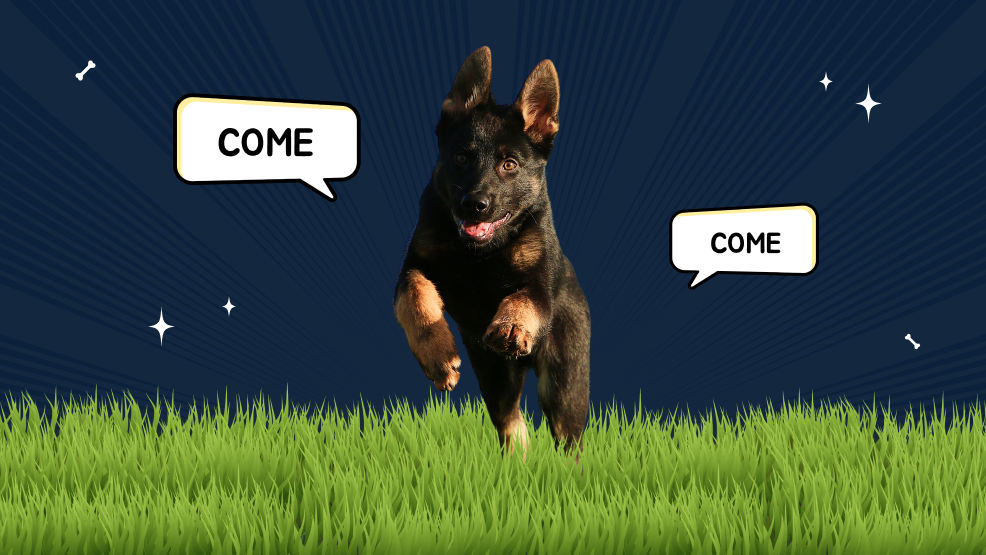
Now that you know about the development phases and when do German Shepherds stop growing, let’s move on to the main thing – training a German Shepherd puppy. One thing you need to remember is that while teaching them is not too difficult, you need to be firm and patient throughout the process. Here are some training guidelines you can follow:
Early Socialization
One of the most critical aspects of training your German Shepherd puppy is early socialization. Socialization refers to the process of exposing your puppy to various environments, people, animals, and situations in a positive and controlled manner. This helps them develop confidence, reduce fear and anxiety, and become well-adjusted companions.
During the socialization period (4-12 weeks), it’s essential to introduce your puppy to various experiences gradually and with patience. This can include:
- Meeting new people (of different ages, genders, and appearances)
- Exposure to different sounds (traffic, household noises, etc.)
- Visiting new places (parks, pet stores, outdoor cafes, etc.)
- Interacting with other friendly dogs and animals
Basic Obedience Training
As your German Shepherd puppy progresses through the socialization and juvenile stages, it’s essential to continue building on their obedience training by introducing new commands and reinforcing the ones they’ve already learned. Here are some basic commands to focus on:
- Sit: This command is often the first one taught and is the foundation for other commands.
- Stay: Teaching your puppy to stay in one place is crucial for their safety and your control.
- Come: Recalling your puppy when called is an essential command for their safety and your peace of mind.
- Down: This command teaches your puppy to lie down on command, which can be useful in various situations.
- Leave It: Preventing your puppy from picking up or consuming something they shouldn’t is an important skill.
- Drop It: Similar to “leave it,” this command teaches your puppy to release an object from their mouth on command.
Remember to keep training sessions short and positive, using positive reinforcement techniques like treats, praise, and play. Consistency and patience are key when teaching new commands, as German Shepherds can sometimes be stubborn.
Positive reinforcement techniques, such as treats and praise, are highly effective in motivating your puppy and reinforcing desired behaviors. So before you start training, get some of the best bones for German Shepherd to motivate them.
House Training and Crate Training
House training and crate training are essential components of raising a well-mannered German Shepherd puppy. These training methods not only help prevent accidents and destructive behaviors but also provide a sense of security and routine for your furry friend.
House Training
House training involves teaching your puppy how to eliminate and establish a consistent routine. Here are some tips for successful house training:
- Establish a regular potty schedule and take your puppy out frequently (after meals, playtime, and naps)
- Choose a designated potty area and consistently take them to the same spot
- Use positive reinforcement (treats and praise) when they eliminate in the correct area
- Be patient and consistent, as accidents are inevitable during the learning process
Crate Training
Crate training is an effective way to create a safe and secure space for your puppy while also aiding during house training. Crates should never be used for punishment but rather as a cozy, den-like area where your puppy can rest and feel secure.
Here are some guidelines for successful crate training:
- Introduce the crate gradually and make it a positive experience (use treats and toys)
- Never leave your puppy in the crate for extended periods beyond their ability to hold their bladder
- Provide plenty of exercise and playtime before crating to prevent destructive behavior
- Never use the crate as a punishment; it should be a comfortable and safe space
- Teaching basic commands to your German Shepherd puppy
As your German Shepherd puppy progresses through the socialization and juvenile stages, it’s essential to continue building on their obedience training by introducing new commands and reinforcing the ones they’ve already learned.
Advanced Training for German Shepherd Puppies
As your German Shepherd puppy matures and masters the basic obedience commands, you may consider advancing their training to include more complex tasks and activities.
German Shepherds are highly intelligent and versatile dogs, excelling in various fields such as obedience competitions, agility trials, tracking, and even specialized work like search and rescue or protection.
Advanced training can include:
- Agility Training: Teaching your German Shepherd to navigate obstacles and courses, improving their coordination and focus.
- Scent Work: Utilizing their exceptional sense of smell for tracking and detection tasks.
- Canine Sports: Participating in activities like flyball, dock diving, or herding trials, which provide mental and physical stimulation.
- Protection/Guard Dog Training: With proper guidance and socialization, German Shepherds can excel in protection and guard dog roles.
It’s important to note that advanced training should only be undertaken with the guidance of experienced trainers and professionals. Additionally, ensure that your German Shepherd has a solid foundation in basic obedience before progressing to more complex training.
Common Challenges in Training German Shepherd Puppies
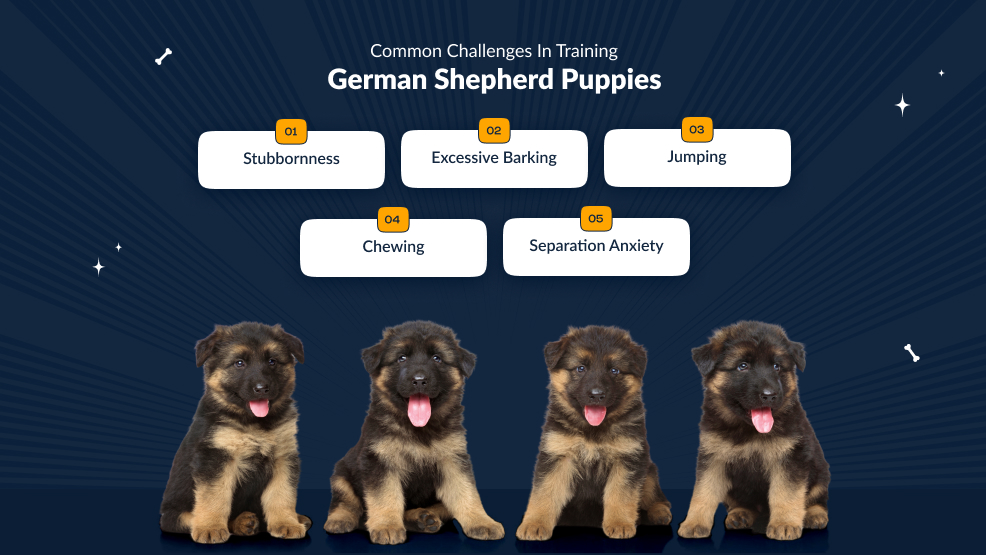
While German Shepherds are highly intelligent and eager to please, they can also present some challenges during the training process.
Here are some common issues you may encounter and strategies to address them:
Stubbornness
German Shepherds can be headstrong and may occasionally exhibit a stubborn streak. Remain patient and use positive reinforcement techniques to encourage desired behaviors.
Excessive Barking
As natural watchdogs, German Shepherds may bark excessively. Teaching the “quiet” command and providing appropriate outlets for their alertness can help manage this behavior.
Jumping
German Shepherds may jump up on people, especially when excited. Consistently ignoring the behavior and rewarding them when all four paws are on the ground can discourage jumping.
Chewing
Puppies naturally urge to chew, and German Shepherds are no exception. Providing appropriate chew toys and redirecting their chewing to acceptable objects can help curb this behavior.
Separation Anxiety
German Shepherds are loyal and may develop separation anxiety if left alone for extended periods. Gradually increasing their alone time and providing mental stimulation can help prevent this issue.
Training your German Shepherd puppy from an early age is not just a matter of convenience; it’s an investment in their overall well-being and the quality of your relationship. By starting training during the critical socialization period and consistently reinforcing positive behaviors, you can shape your puppy into a well-adjusted, obedient, and confident companion.
The benefits of early training extend far beyond just good behavior. It promotes a stronger bond between you and your furry friend, enhances their socialization skills, and provides them with the mental stimulation they crave. Additionally, a well-trained German Shepherd is less likely to develop behavioral issues, reducing the risk of potential problems down the line.






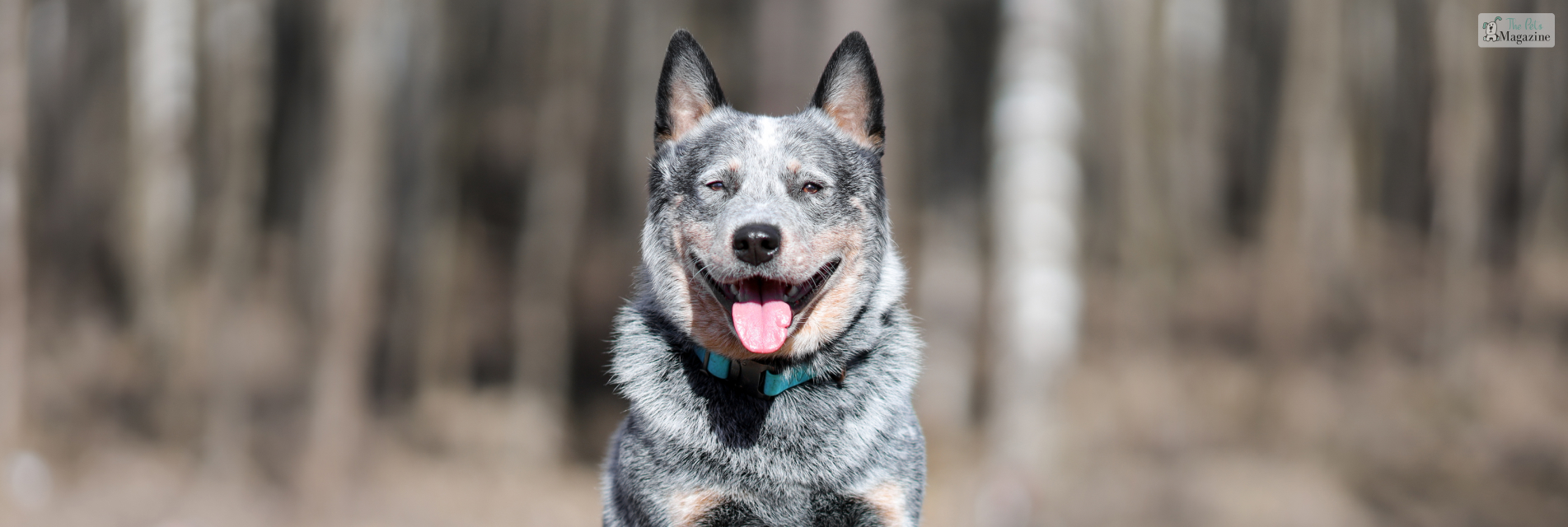
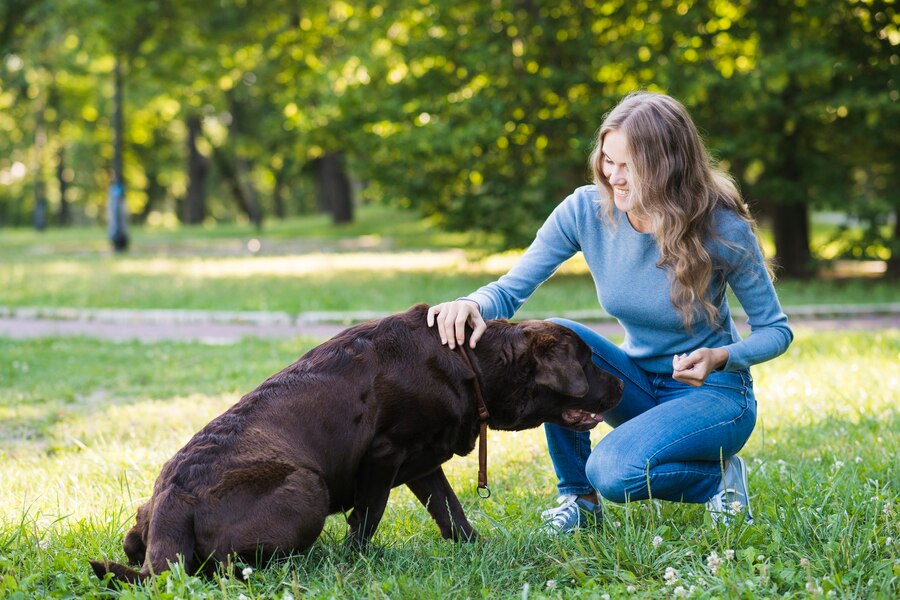

Leave A Comment